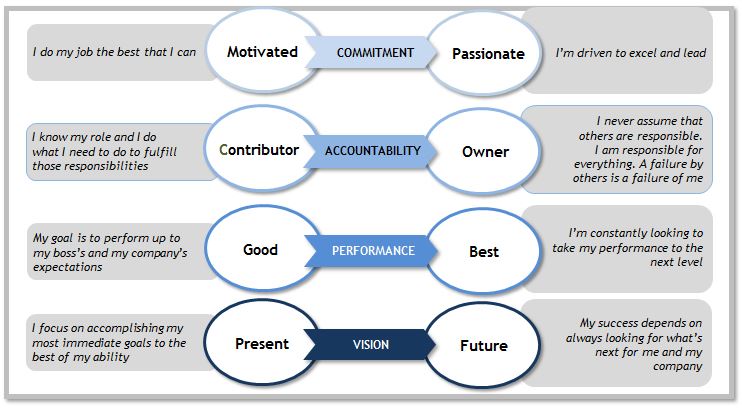In my first post in this series on the five roles of Prime Leadership, I introduced you to the concept of a Prime Leader : “someone who creates, inspires, prepares, and directs a team to perform, individually and collectively, at its highest level consistently under the most challenging conditions in pursuit of a valued goal.” I then describe the five roles that you must fulfill to be a great leader.
In my second post in the series, titled Leader-as-Person, I showed you that how you lead is a result of who you are and offered some ways in which you can figure out who you are.
This post extends my discussion of Leader-as-Person by exploring the role that your mindset plays in how you approach your leadership. I define mindset as the attitudes, beliefs, and expectations you hold that act as the foundation of who you are, how you lead, and the ways in which you interact with your team.
Your mindset is so influential because it determines how you think about and interpret situations, your emotional reactions, the decisions you make, and the actions you take. Your mindset directly impacts the quality of your relationships, the interactions you have, and the way you lead. It also sets the tone for your organization and determines the kind of experiences your people have in their work lives.
Your mindset isn’t just a bunch of touchy-feely psychology and relationship stuff either. It also has a big effect on your company’s bottom line, setting the stage of its performance, productivity, and, ultimately, its profitability.
Your goal is to identify and create productive mindsets that result in Prime Leadership.
There are four mindsets that I believe are important to have to be the most effective leader you can be.
Commitment
The foundation of leadership is a determined and unwavering commitment to lead, perform, and succeed. The amount of commitment that you bring to your role sends a powerful message of commitment to those with whom you work. Being motivated, for example, saying, “ I do my job the best that I can.”, isn’t enough. That will only lead to the basics of business success getting done.
As a leader, you must be passionate, meaning you are truly driven to lead and excel. You know that the “devil is in the detail” and you are committed to doing everything as well as possible and going above and beyond what is expected.
Accountability
The first mindset involves the degree of accountability you are willing to assume in your role in your company. Most members of a company are mostly in the role of contributor in which they might say, “I know my role and I do what I need to do to fulfill those responsibilities.” Such a mindset clearly won’t enable you to assert your leadership.
You must take on the role of owner in which you say, “I never assume that others are responsible. I am responsible for everything. A failure by others is a failure by me.” As an owner, you take the lead in all aspects of your company’s (or your team’s within the company) functioning and performance.
Performance
It is almost a cliché, but also a truism that great leaders must not only “talk the talk,” but also “walk the walk” when it comes to their job responsibilities. If you want your team to perform at its highest level, you must first do so. The reality is that good is no longer good enough in the global and connected business world. Economic instability and competition from around the world makes it so that what was once sufficient to succeed now will only guarantee failure.
The most successful leaders and companies know that nothing but the best is good enough to survive in the current business climate. As a leader, you must talk about and demonstrate that “I’m constantly look to take my performance to the next level.”
Vision
In the fast-paced business world in which we now live, it’s easy to get caught up in the daily challenges of running a company. The problem is that if you get so busy in the day-to-day machinations of corporate life, you forget to look ahead to see what might be coming up. What lies ahead may be a great opportunity waiting to be embraced or a multi-car crash that you need to avoid. In either case, if you’re not looking toward the horizon, the future will become the present without your being ready for it.
That’s where, as former President George H.W. Bush put it so well, the “vision thing” comes into play. A great leader can’t just be paying attention to the present—“I focus on accomplishing my most immediate goals to the best of my ability.” A myopic view of your business world will only result in a slow and painful corporate death.
Because true success in the business world isn’t judged by the year or even the decade, your vision of the company’s and its industry’s future is paramount—“Our success depends on always looking for what is next for our company.” Recognizing trends, creating new products and services, identifying new markets, and predicting future threats are just a few ways in which a clear vision can help ensure your company’s long-term viability.
Exercise
I would like to conclude with an exercise that I hope will raise your awareness of your mindset in these four areas and, if necessary, help you make a shift in a more productive direction.
First, rate yourself on a 1-10 scale on each mindset where one is the lowest level of each and ten is the highest.
Second, if you rated yourself at a level that warrants improvement, identify specific and actionable steps you can take to improve each of the four mindsets.

